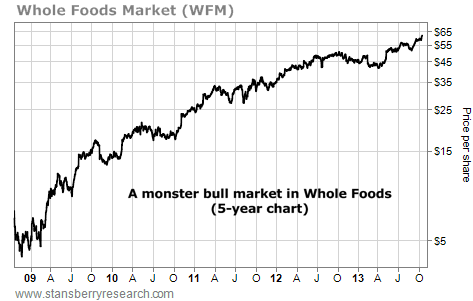| Home | About Us | Resources | Archive | Free Reports | Market Window |
So Long, BenBy
Wednesday, October 16, 2013
Last week, we lost a great friend – Ben Bernanke.
His replacement, Janet Yellen, was nominated one week ago. But Ben has secured his place in history…
No other Federal Reserve chairman in history did so much to improve my fortunes… or those of the newsletter I write.
What could have inspired more Americans to turn to a hard-money, alternative source of financial insight than a Fed chairman dedicated to destroying the purchasing power and savings of his fellow citizens?
And who, besides that priceless naïf with his printing press, could have done more to provide easier, safer, and more obvious ways of increasing my personal wealth? Bernanke permitted and encouraged the largest housing bubble in history. Its inevitable collapse allowed me to buy rental real estate paying yields in excess of 20% and trophy properties in Miami Beach for prices last seen 15 years ago.
In his first major policy speech after joining the Federal Reserve Board of Governors in 2002, Bernanke spelled out that an enormous inflation was on the horizon, as it was the only sensible solution to our country's massive debt load.
Bernanke's speeches allowed anyone with ears and gray matter between them to lever up into hard assets, like gold, silver, oil, and farmland – trades that have been unbelievably profitable. And for the very, very rich... Bernanke did even more, God bless him. Bernanke dropped real interest rates well into negative territory. That allowed the world's wealthiest capitalists – like renowned investor Warren Buffett and Stephen Schwartzman, head of the private-equity firm Blackstone Group – access to unprecedented amounts of capital at rates of interest that literally paid them to borrow.
They did the only logical thing... they responded with a wave of leveraged buyouts that dwarfed every other private-capital cycle in history. Immediately following Bernanke's ascension to the Fed chairman's seat in February 2006, U.S. private-equity firms bought out 654 U.S. companies, spending $375 billion (of mostly borrowed money) in just over a year. To give you some idea of the scale of this Bernanke-led boom, this series of deals involved 18 times more money than all of the private-equity deals done in 2003.
This was a massive aggregation of wealth. Almost none of these deals would have been possible without Bernanke's policies.
And he was as good as his word. When the debt bubble finally burst, Ben did exactly as he promised he would. He matched the Treasury's deficit spending with newly created money and bought more than $3 trillion worth of Treasury bonds and mortgage bonds.
At the end, Ben's policies had grown so completely out of control, it was possible for Brazilian entrepreneurs to borrow immense sums at such low rates that they began buying out iconic American brands, literally our country's greatest businesses – like Budweiser and later Heinz. The Chinese, powered by the same wave of Bernanke dollars, opted to begin buying out our oilfields. Soon, we believe, they will begin buying private homes.
Yes, for rich people all around the world, Ben has been a living saint. Thank you, Ben! We couldn't have done it without you! None of us ever thought we'd be quite this rich... or end up owning all of those incredible assets.
Meanwhile, the people whom Ben fleeced – the workers, the savers, the few Americans left with simple industry and thrift, the kind of folks who would never have believed the government would actively try to hurt them – have been wiped out. They've seen the real value of their wages, savings, and standard of living decline by huge amounts.
Tomorrow, I'll show you exactly what I mean...
Government measures of inflation have been "adjusted" so many times over the years that they're nearly meaningless.
But I can show you real indicators, which are real and "unadjusted." They show in simple, stark terms exactly what Bernanke did to our economy.
Regards,
Porter Stansberry
Further Reading:
"Let's face it," Porter writes... "My work is mostly for wealthy people who mainly want to continue to be wealthy. So I've focused on how to prepare for these changes from the perspective of an investor – someone whose primary goal is to earn a return on his capital. I had precious little to offer regular wage-earners."
But in a recent essay, he addressed folks who are already struggling to maintain their standard of living... Find his solution here: Your Best Chance at Living Well in the End of America.
Market NotesIT'S A BULL MARKET IN EXPENSIVE FOOD People are spending a lot of money at Whole Foods. And that's more proof "things can't be all that bad" with the U.S. economy.
Over the past few years, we've featured dozens of charts that show the U.S. economy is doing better than the pessimists would have you think. For example, Home Depot has skyrocketed because people are spending lots of money on new bathrooms, remodeled kitchens, and backdoor patios.
Another indicator of America feeling flush is the soaring sales and share price of Whole Foods. Whole Foods is America's No. 1 "luxury grocer." Its business is selling expensive food. And business is good. Profits have climbed more than 33% in each of the last three years.
The chart below shows that investors are paying attention to the trend. Shares of Whole Foods are up 1,200% since the beginning of 2009. They just hit an all-time high. We see all this spending on "luxury food" and think things "can't be all that bad" with the U.S. economy.
 |
In The Daily Crux
Recent Articles
|


